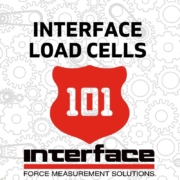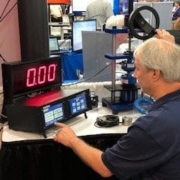Trends in Torque Transducer Applications in the Auto Industry
 Torque transducers are crucial in force measurement testing, especially in the automotive industry. A torque sensor is a transducer that converts a torsional mechanical input into an electrical output signal.
Torque transducers are crucial in force measurement testing, especially in the automotive industry. A torque sensor is a transducer that converts a torsional mechanical input into an electrical output signal.
Interface’s experience suggests the automotive industry’s most frequently used torque transducers are rotary torque transducers, like our AxialTQ, which measure dynamic force. These transducers are necessary for applications where the torque transducer must rotate when attached to a spinning shaft. A rotary torque transducer provides a method of getting the signal off the rotating element without an attached cable.
Automotive testing labs also commonly use a fixed-style mount instead of a floating style. This is because fixed types are ideal for high-speed applications. Fixed and supportive mounting is often mandatory. Fixed mounts apply only to sensors with bearings, which involves attaching the sensor housing to fixed support for added stability.
Torque plays a critical role in automotive testing, and Interface has more than 50 transducer models with multiple capacities and sizes. Use our Torque Transducer Selection Guide to help define the suitable model for your specific application.
Interface will demonstrate the range of torque transducer solutions at the upcoming Auto Test Expo. You can get your free pass online.
Top Trends in Torque Transducer Applications
Torque transducers create faster, more efficient, and safer vehicles. Interface transducers are designed to meet the growing demands of the auto industry.
- Interface recognizes the growing use of torque transducers to measure the performance of electric vehicles (EVs). Torque transducers are essential for testing the performance of their electric motors and powertrains. Torque transducers are used to measure the torque output of electric motors, which is critical for ensuring that they meet their performance specifications. Read Torque Measurement for Electric Vehicles.
- Interface torque transducers are helping to assess advanced driver assistance systems (ADAS) performance. ADAS systems rely on numerous sensors, including torque transducers, to measure and control the vehicle’s dynamics. Torque transducers measure the torque applied to the steering wheel and brakes, which ensures that ADAS systems function correctly.
- Torque transducers measure the torque applied to the wheels, which ensures that autonomous vehicles can safely navigate their environment.
Torque transducers are essential research, design, testing, and manufacturing tools. As emerging automotive technologies evaluate new components, materials, and vehicle capabilities, torque transducers provide vital measurement data to assess performance. We see this in the use cases for torque transducers in all phases of developing autonomous and self-driving vehicles, including the transition to flying cars.
- More miniature and more lightweight torque transducers are helpful for integration into test apparatus and vehicles. Interface’s miniature torque products, including our MRT Miniature Flange Style Reaction Torque Transducer and MRT2 Miniature Flange Style Reaction Torque Transducer, are popular for these testing use cases. Learn more in our Miniature Torque Transducers 101 post.
- Wireless torque transducer applications eliminate the need for cables and wires, making testing more convenient and efficient. Check out our Wireless Telemetry Systems 101 and the AxialTQ™ Wireless Rotary Torque Transducer.
Automotive Applications Using Interface Torque Transducers
AxialTQ™ Engine Dynamometer
One of our customers needed to measure the torque and the speed (RPM) produced by an engine and calculate it simultaneously. Using the Interface AxialTQ Wireless Rotary Torque Measurement System, which was developed in direct collaboration with over 30 end-users who shared their wish lists for operational priorities, user interface, design, features, real-world field issues, and more, the customer was able to measure and calculate the torque and rotational speed (RPM) of the engine in real-time while collecting the data accurately and simultaneously.
Lug Nut Assembly
Proper lug nut assembly is critical to a quality vehicle and meeting strict quality and safety requirements. Interface’s customer wants to increase productivity for automobile wheel installation while ensuring the lug nuts are installed to the proper torque values for safety. Interface supplied five T33 Spindle Torque Transducers for use in the customer’s wheel installation assembly machine, which comes standard with +/-5VDC analog output for torque measurements and a 360 pulse, 2-track encoder for speed/angle measurement. The customer could perform five simultaneous torque measurements during wheel installation in seconds using this solution. The T33 Spindle Torque Transducer provided a +/-5VDC signal for torque and a TTL signal for angle measurement to the customer’s control system for logging, evaluating, and recording the results.
Another important consideration for testing torque with these sensors is the coupling. Couplings are a critical component of the torque transducer that ensures the isolation of torque loads. Couplings should be used in all applications, and the selection of the coupling type is based on the speed of the application. For higher-speed applications, you will want to look for high-quality couplings. The coupling helps to prevent error and damage from extraneous loads. You can learn more about selecting the proper coupling in our new blog, Torque Transducers and Couplings are the Perfect Pairing.
Every industry segment has numerous priorities as they compete to design, engineer, build, and supply new and innovative vehicles. From the focus on the extreme performance of racing vehicles to the safety focus of consumer automobiles, Interface can provide force and torque measurement solutions to help you today and in the future.
ADDITIONAL RESOURCES
Fuel Pump Optimization & Rotary Torque
Accelerating Automotive Excellence in the Test Lab
Force Measurement Solutions Demonstrations at Automotive Testing Expo







